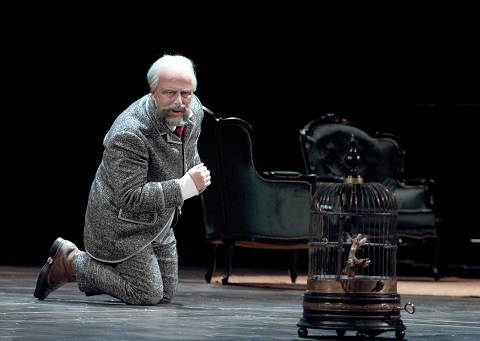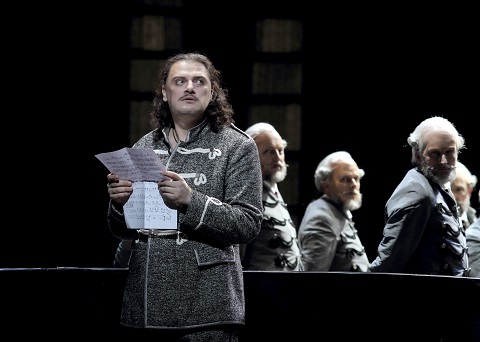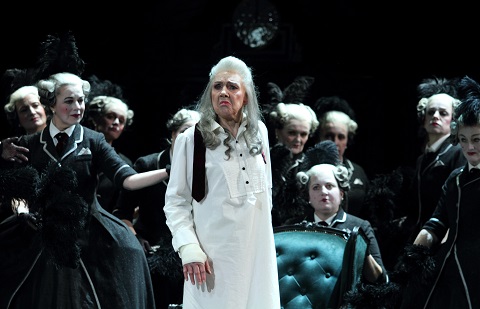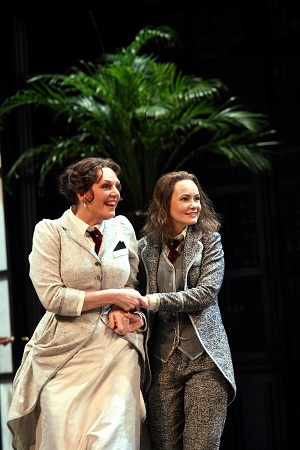
14 Jan 2019
Opera as Life: Stefan Herheim's The Queen of Spades at Covent Garden
‘I pitied Hermann so much that I suddenly began weeping copiously … [it] turned into a mild fit of hysteria of the most pleasant kind.’
English Touring Opera are delighted to announce a season of lyric monodramas to tour nationally from October to December. The season features music for solo singer and piano by Argento, Britten, Tippett and Shostakovich with a bold and inventive approach to making opera during social distancing.
This tenth of ten Live from London concerts was in fact a recorded live performance from California. It was no less enjoyable for that, and it was also uplifting to learn that this wasn’t in fact the ‘last’ LfL event that we will be able to enjoy, courtesy of VOCES8 and their fellow vocal ensembles (more below …).
Ever since Wigmore Hall announced their superb series of autumn concerts, all streamed live and available free of charge, I’d been looking forward to this song recital by Ian Bostridge and Imogen Cooper.
The Sixteen continues its exploration of Henry Purcell’s Welcome Songs for Charles II. As with Robert King’s pioneering Purcell series begun over thirty years ago for Hyperion, Harry Christophers is recording two Welcome Songs per disc.
Although Stile Antico’s programme article for their Live from London recital introduced their selection from the many treasures of the English Renaissance in the context of the theological debates and upheavals of the Tudor and Elizabethan years, their performance was more evocative of private chamber music than of public liturgy.
In February this year, Albanian soprano Ermonela Jaho made a highly lauded debut recital at Wigmore Hall - a concert which both celebrated Opera Rara’s 50th anniversary and honoured the career of the Italian soprano Rosina Storchio (1872-1945), the star of verismo who created the title roles in Leoncavallo’s La bohème and Zazà, Mascagni’s Lodoletta and Puccini’s Madama Butterfly.
Evidently, face masks don’t stifle appreciative “Bravo!”s. And, reducing audience numbers doesn’t lower the volume of such acclamations. For, the audience at Wigmore Hall gave soprano Elizabeth Llewellyn and pianist Simon Lepper a greatly deserved warm reception and hearty response following this lunchtime recital of late-Romantic song.
Collapsology. Or, perhaps we should use the French word ‘Collapsologie’ because this is a transdisciplinary idea pretty much advocated by a series of French theorists - and apparently, mostly French theorists. It in essence focuses on the imminent collapse of modern society and all its layers - a series of escalating crises on a global scale: environmental, economic, geopolitical, governmental; the list is extensive.
For this week’s Live from London vocal recital we moved from the home of VOCES8, St Anne and St Agnes in the City of London, to Kings Place, where The Sixteen - who have been associate artists at the venue for some time - presented a programme of music and words bound together by the theme of ‘reflection’.
'Such is your divine Disposation that both you excellently understand, and royally entertaine the Exercise of Musicke.’
Amongst an avalanche of new Mahler recordings appearing at the moment (Das Lied von der Erde seems to be the most favoured, with three) this 1991 Mahler Second from the 2nd Kassel MahlerFest is one of the more interesting releases.
‘And there was war in heaven: Michael and his angels fought against the dragon; and the dragon fought and his angels, And prevailed not; neither was their place found any more in heaven … that old serpent … Satan, which deceiveth the whole world: he was cast out into the earth, and his angels were cast out with him.’
If there is one myth, it seems believed by some people today, that probably needs shattering it is that post-war recordings or performances of Wagner operas were always of exceptional quality. This 1949 Hamburg Tristan und Isolde is one of those recordings - though quite who is to blame for its many problems takes quite some unearthing.
There was never any doubt that the fifth of the twelve Met Stars Live in Concert broadcasts was going to be a palpably intense and vivid event, as well as a musically stunning and theatrically enervating experience.
‘Love’ was the theme for this Live from London performance by Apollo5. Given the complexity and diversity of that human emotion, and Apollo5’s reputation for versatility and diverse repertoire, ranging from Renaissance choral music to jazz, from contemporary classical works to popular song, it was no surprise that their programme spanned 500 years and several musical styles.
The Academy of St Martin in the Fields have titled their autumn series of eight concerts - which are taking place at 5pm and 7.30pm on two Saturdays each month at their home venue in Trafalgar Square, and being filmed for streaming the following Thursday - ‘re:connect’.
The London Symphony Orchestra opened their Autumn 2020 season with a homage to Oliver Knussen, who died at the age of 66 in July 2018. The programme traced a national musical lineage through the twentieth century, from Britten to Knussen, on to Mark-Anthony Turnage, and entwining the LSO and Rattle too.
With the Live from London digital vocal festival entering the second half of the series, the festival’s host, VOCES8, returned to their home at St Annes and St Agnes in the City of London to present a sequence of ‘Choral Dances’ - vocal music inspired by dance, embracing diverse genres from the Renaissance madrigal to swing jazz.
Just a few unison string wriggles from the opening of Mozart’s overture to Le nozze di Figaro are enough to make any opera-lover perch on the edge of their seat, in excited anticipation of the drama in music to come, so there could be no other curtain-raiser for this Gala Concert at the Royal Opera House, the latest instalment from ‘their House’ to ‘our houses’.
"Before the ending of the day, creator of all things, we pray that, with your accustomed mercy, you may watch over us."

‘I pitied Hermann so much that I suddenly began weeping copiously … [it] turned into a mild fit of hysteria of the most pleasant kind.’
Quite, one might remark, upon seeing Stefan Herheim’s production of The Queen of Spades, first seen in Holland in 2016, and now given its UK premiere at the Royal Opera House.
Tchaikovsky’s letter to his brother Modest illustrates how boundaries between the real and imagined can be breached, with, perhaps, a conflicting mix of positive and negative artistic and personal consequences: ‘It seems to me that Hermann was … all the while a real, living human being, at the same time sympathetic to me … because Figner [the lyric-dramatic tenor Nikolai Figner who created the role of Hermann in The Queen of Spades at its premiere on 19th December 1890 at the Maryinsky Theatre in St Petersburg] is very sympathetic to me … I also felt the most lively concerns for his misfortunes. Now I think this warm and lively relationship with the opera’s hero has probably expressed itself beneficially in the music’.
Opera as life, then. This is Herheim’s starting-point. The text projected onto a front-drop in the silence before Act 1 commenced reminded us of Tchaikovsky’s repressed homosexuality and consequent suffering, and of his death by cholera - a possible suicide-by-polluted-water, it is inferred, to prevent the revelation of his sexual proclivities and activities.
There are few, surely, who would deny the connections between life and art. And, in his recent book, Disordered Heroes in Opera, musicologist and psychiatrist John Cordingly cites the view of scholar Robert Layton that ‘Perhaps in Hermann, [Tchaikovsky] saw something of himself, unable to escape Fate and almost imprisoned by its inevitability’, and suggests that ‘Hermann’s sudden passion for Liza could even be seen as an attempt to resolve his latent homosexuality by a hasty marriage that could never work’: an allusion to Tchaikovsky’s own aborted marriage with Antonina Milyikova. Alternatively, Cordingly posits that perhaps, ‘Liza ‘stands in’ for a male lover, and he/she has to die as there can be no future in a homosexual relationship’.
Such theoretical and scholarly speculations are transformed into unyielding dramaturgical principles in Herheim’s production. The director re-imagines the opera as a fervent dream - at times a psycho-sexual fantasy - in the mind of Tchaikovsky. He inserts the composer, embodied by baritone Vladimir Stoyanov, into every scene, and suggests that the opera is being created in ‘real time’. To hammer this point home, ‘Tchaikovsky’ hyperactively waves and waggles his arms, ‘conducting’ the sound he imagines/we hear, vigorously plucks up his quill and scribbles on outsize manuscript sheets, and seats himself at the ebony grand piano offering in his keyboard excursions a fair impression of Liberace. It’s so cringe-making that I wondered if that was indeed ‘the point’: that this histrionic physical representation of creative invention and expression was a parody of the melodramatic self-dramatisation of the mythic Romantic artist … but I think that would be too subtle for a production that slathers on its concepts with a trowel.
 .Aleksandrs Antonenko as Hermann. Photo credit: Catherine Ashmore.
.Aleksandrs Antonenko as Hermann. Photo credit: Catherine Ashmore.
What makes the hyperactivity all the more infuriating is that it goes on, and on, and on … why doesn’t Herheim trust us to get the point during the overture and opening scene. Here ‘Tchaikovsky’ humiliatingly pays a man, who turns out to be Hermann, for the previous night’s homoerotic encounter, and then collapses in a psychosomatic fit of self-castigation and disgust, falling on the floor beside a bird cage from which emits Mozart’s ‘Ein Mädchen oder Weibchen’. Presumably, the parakeets represent the composer’s own caged spirit; though Herheim might reflect on the fact that the implication of his own production is that it is in fact the bars of the cage which inspire the composer’s song: repression feeds creative expression. Whatever, it’s all irritating, fussy and messy. It didn’t help that a gentleman seated just across the aisle from me in the stalls seemed inspired by ‘Tchaikovsky’s’ arm-flapping so as to indulge in his own air-conducting throughout the performance. There was no escaping the (non-)rhythmic air-beating.
 Felicity Palmer as Countess. Photo credit: Catherine Ashmore.
Felicity Palmer as Countess. Photo credit: Catherine Ashmore.
It is baritone Vladimir Stoyanov who embodies the opera’s composer, alongside his minor vocal role as Liza’s fiancé Prince Yeletsky, a role not present in the original Pushkin tale. And, it should be noted first and foremost that Stoyanov sang the latter role beautifully, injecting dignity and gravity into the surreal and hyper-real bizarreness of the production, and communicating real human feeling in a production where exaggeration, excess and subversion are the norm. But, the perpetual presence of ‘Tchaikovsky’ in scenes which establish the emotional tenor of the situations and relationships in Puskhin’s tale (yes, there is a actually a dramatic ‘narrative’, one that gets rather side-lined here) is a hindrance to dramatic coherence and consistency. In Act 2 Scene 1, when Liza arranges a nocturnal assignation with Hermann in order to give him the key to her grandmother’s room, so that he may access her own, it’s infuriating that the would-be lovers address their remarks to the composer scribbling their melodies rather than to each other; at one point Tchaikovsky seemed to morph into Yeletsky, and I was put in mind of Princess Diana’s quip that there “there were three of us in this marriage, so it was a bit crowded”. When Liza splutters to Tchaikovsky/Yeletsky, “You, you here?”, I wanted to add, “my thoughts entirely”. Tchaikovsky turns up in every scene. Anna Goryachova’s Paulina massages his shoulders during her sad ballad; when Hermann fears the arrival of the Angel of Death, Tchaikovsky turns up, pointing a pistol.
The design is no more coherent. The majority of the action takes places within Tchaikovsky’s music room, the grand piano omnipresent even as the dramatic locations changes (the populace’s eulogising of the unseasonable sunshine and fears of the storm don’t make much sense when we’re confined indoors), and the panels laden with books and scores swivel and slide into new formations. Which century are we in? Philipp Fürhofer’s sets suggest Tchaikovsky’s own age, but the Act 2 Mozartian pastiche shifts us to the 18 th century, for a masked ball which morphs into psychedelic madness. The enormous chandelier swings pendulously, smoke billows, lights flicker and the chorus’s limbs quiver - though one has to admire Bernd Purkrabek’s bristling, buzzing lighting design.
Satyrs-cum-San Sebastian arrive, their modesty protected by loin cloths, their bodies pierced by quills (what else?). The divertissement dives further with the arrival Milovzor (Goryachova) and Prilepa (Jacquelyn Stucker) decked out in imitation of Tchaikovsky’s caged birds. This pseudo Papageno/Papagena pair, resplendent in blue and red plumage, indulge in sexual shenanigans with each other and with Tchaikovsky, and the psychological chaos culminates with a hymn of praise thundered out to Catherine the Great by the chorus, lining the stalls’ aisles - ineffectively trying to get the audience to stand in homage and join in the game - as, on stage, Tchaikovsky leans to kiss the Empress’s hand, only to find that he’s slobbered over the palm of Hermann-in-drag. Distorted glass reflects the auditorium back at the audience. Virginia Woolf essayed a similar essay with shards and fragments at the end of Between the Acts, but on this occasion the general response seemed to be annoyance and alienation rather than discomforting complicity.
 Eva-Maria Westbroek as Liza and Anna Goryachova as Paulina Photo credit: Catherine Ashmore.
Eva-Maria Westbroek as Liza and Anna Goryachova as Paulina Photo credit: Catherine Ashmore.
Such redundant excess left one feeling rather out of breath. So, to turn to ‘important’ matters, what of the singing? John Lungrend’s Count Tomsky delivered an excellent narration of the history of the Countess and the cards - thank goodness that some of Pushkin’s tale survived - and Felicity Palmer, despite the travesties of manner and mode infliction upon her, delivered a wonderfully nuanced and daringly pianissimo reminiscence of her youth in ‘Je crains de lui parler la nuit’, supported by skilfully coloured accompaniment from the ROH Orchestra (some terrific bassoon playing!).
Elsewhere, things were more uneven. The first duet for Goryachova’s be-trousered Paulina and Eva-Maria Westbroek’s Liza skidded off the rails. Both found their feet subsequently, but Westbroek’s voice doesn’t seem to have retained its winning bloom, which further weakens our sympathy for and understanding of the central characters; some of the soprano’s final episodes were quite unyielding and hard.
The biggest disappointment was Aleksandrs Antonenko’s Hermann: there were some moments of vocal beauty, particularly in the middle of his voice, but all too often the tenor sounded ragged and raw. His solution when he couldn’t reach the top was to shout, approximating pitch. Perhaps such ‘roughness’ was designed to convey Hermann’s emotional agonies? But, Hermann came across as not so much unstable as unhinged: certainly the lurches between pitches and vocal hues were as disconcertingly disruptive as Hermann’s staggering between elation and despair. It was difficult to identify with this Hermann - though perhaps this was not solely Antonenko’s fault, given that he was called upon to impersonate a male prostitute and Catherine the Great.
Pappano found bold orchestral colours and strokes - trombones, celli, harp all came effectively to the fore; and the overall sweep was persuasive. The (expanded) ROH Chorus were on fine form, but I got fed up with their taunting toasts to Tchaikovsky, tumblers of chilled water sloshing with impure infection - drink up your cholera!
Pushkin’s narrative is not complemented, enriched, or opened up to potential new meanings by Herheim’s psychoanalytical indulgences; it is just annihilated. There are no cards, no supernatural horror, no real human love. In reply to Madame von Meck’s question as to whether Tchaikovsky had experience ‘non-Platonic love’, the composer replied: ‘If … by asking whether I’ve experienced full happiness in love, then the answer is no, no, and no again!!! … But if you ask me whether I appreciate all the power, all the inevitable force, of this emotion, then I’ll answer yes, yes and yes again, and I would say again that I’ve repeated tired to express lovingly in my music the torments and bliss of love.’
What a pity that Herheim neglects such bliss, such human consolation, in favour of over-blown psychoanalytical blustering.
Claire Seymour
Tchaikovsky: The Queen of Spades
Hermann - Aleksandrs Antonenko, Prince Yeletsky/Tchaikovsky - Vladimir Stoyanov, Liza - Eva-Maria Westbroek, Countess - Felicity Palmer, Count Tomsky - John Lundgren, Chekalinsky - Alexander Kravets, Paulina - Anna Goryachova, Surin - Tigran Martirossian, Governess - Louise Winter, Major-domo - Harry Nicoll, Prilepa - Jacquelyn Stucker, Chaplitsky - Konu Kim, Narumov - Michael Mofidian; Director - Stefan Herheim, Conductor - Antonio Pappano, Designer - Philipp Fürhofer, Lighting designer - Bernd Purkrabek, Dramaturg - Alexander Meier-Dörzenbach, Orchestra and Chorus of the Royal Opera House.
Royal Opera House, Covent Garden, London; Sunday 13th January 2019.